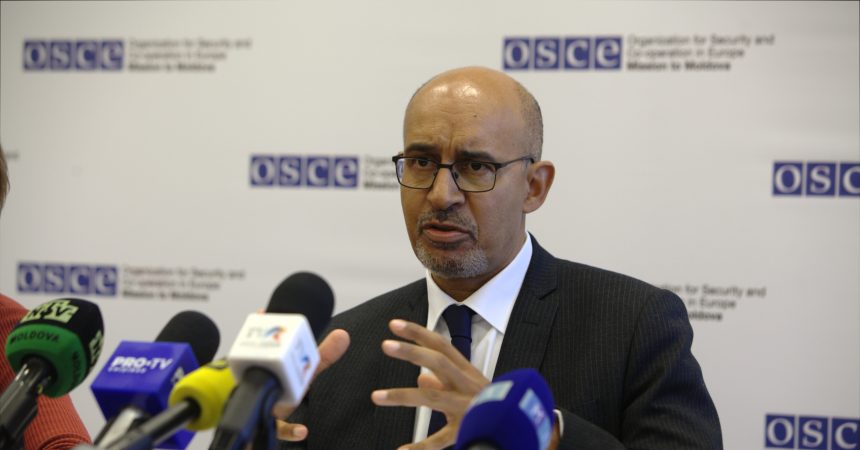Harlem Désir, an influential figure who has worked fearlessly for the protection of the free press, will no longer serve as Representative on Freedom of the Media at OSCE after Azerbaijan and Tajikistan blocked the renewal of his mandate.
Désir has been an outspoken representative at the OSCE (Organisation for the Security and Cooperation in Europe), a position he occupied for the past three years. His reappointment has now been blocked by two of the worst countries with world press freedom records.
International press freedom organisation Reporters Without Borders (RSF) said this was the most disruptive behaviour yet from Azerbaijan and Tajikistan.
“The work of the Representative on Freedom of Media is absolutely crucial to the protection of media freedom across the OSCE’s 57 Member States, especially in the worst offenders, including the two States that have now blocked Harlem Désir’s reappointment. They can now effectively evade OSCE scrutiny,” RSF’s Director of International Campaigns, Rebecca Vincent, said.
The blocking of Désir by the two States raises the question of whether countries that have a tragic record in protecting journalists and the free press should be allowed to have such power in international fora.
“Azerbaijan has form for this, having behaved similarly disruptively at the Council of Europe for years. How long will these institutions allow themselves to be hijacked by States that don’t share their values?” RSF added.
Azerbaijan and Tajikistan – the countries with the worst press freedom records in the OSCE region (apart from Turkmenistan) – have succeeded in blocking the reappointment of @harlemdesir as @OSCE_RFoM. Shameful.
A short thread. https://t.co/i8hUACmKFM
— Rebecca Vincent (@rebecca_vincent) July 10, 2020
A number of international press freedom organisations, include the European Centre for Press and Media Freedom, Article 19 and the European Federation of Journalists, that echoed the condemnation and called on OSCE participating States to uphold their international commitments and to support the renewal of Désir mandate before it expires on 19 July.
The European Federation of Journalists issued a statement signed by 29 other free press organisations, expressing their concern about the blocking of Désir’s renewal.
“We understand the move by Azerbaijan and Tajikistan is an attempt to weaken the essential watchdog function of the mandate.” The organisations highlighted the crucial support that Désir has been providing to journalists and media organisations.
Statement in support of the mandate of the OSCE Representative on Freedom of the Media via @efjeurope https://t.co/URqCgwlmaF #osce
— EFJ (@EFJEUROPE) July 10, 2020
Désir has thanked every single organisation that expressed its disappointment at his departure. The impact of his loss on press freedom work around the world is immeasurable.
Désir has been closely monitoring the situation in Malta following the assassination of journalist Daphne Caruana Galizia. He visited Malta to attend the journalist’s funeral and had addressed the conference organised by The Shift and RSF on the second anniversary of her brutal killing.
In an interview with The Shift, Désir had insisted that there can be no mercy for those responsible for the journalist’s assassination.
Désir had harsh words for Konrad Mizzi’s nomination as Head of the Maltese delegation to the Parliamentary Assembly of the OSCE. Speaking to The Shift, Désir had said that Mizzi’s nomination was simply “incomprehensible and disturbing”.
The attempts by the Azerbaijani regime to stifle media freedom have been the subject of numerous discussions and investigations. Blocking Désir’s mandate is just the most recent of tactics on international platforms.
OCCRP (Organised Crime and Corruption Reporting Project) had revealed how a number of MEPs including Spain, Germany and Belgium, had received bribes from the Azerbaijani lobbyists.
Through four shell companies registered in the UK, the Azerbaijani regime was found to be laundering money that was then used to pay off European politicians over a two-year period.
It was revealed that a German MEP had received the money while she was serving as a member of the PACE (Parliamentary Assembly for the Council of Europe) when it voted down a key resolution on politically motivated imprisonment by Azerbaijan.
Malta has a cosy relationship with Azerbaijan, with members of the ruling elite involved with the now-defunct Pilatus Bank in Malta and disgraced former Prime Minister Joseph Muscat joining the President’s think-tank to ‘promote the country’s culture and values’ around the world – a typical tactic used by dictators around the world.













